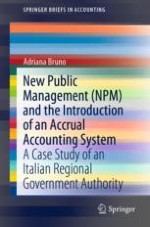2021 | Buch
New Public Management (NPM) and the Introduction of an Accrual Accounting System
A Case Study of an Italian Regional Government Authority
verfasst von: Adriana Bruno
Verlag: Springer International Publishing
Buchreihe : SpringerBriefs in Accounting
